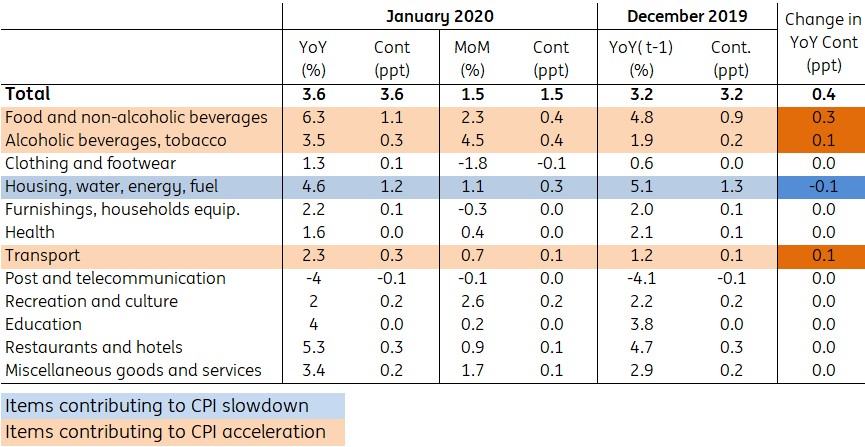Czech Republic sees weaker growth and higher inflation
The Czech economy slowed down more than expected in 4Q19 but inflation surpassed market estimates mainly due to stronger than expected food prices
GDP slowed down more than expected
The Czech economy slowed down in the last quarter of 2019 to 1.7% year-on-year and 0.2% QoQ. Although some slowdown was expected, the market expected growth of 2% while the central bank and the finance ministry expected 1.9%, so the figure was somewhat disappointing.
We don't know the details yet but household consumption was the main growth factor. For the whole of 2019, the economy accelerated by 2.4% YoY after 2.8% in 2018. However, given the less favourable developments abroad and the weak German growth, we expect Czech GDP to slow to 2% in 2020.
Inflation at highest level since March 2012
January inflation surprised on the upside and rose from 3.2% in December to 3.6% - the highest level since March 2012. Thus, it exceeded both market expectations of 3.2% and central bank estimates of 3.3%. January inflation is always usually a little difficult to estimate, as many prices are being changed early in the year. Therefore even the range of analysts' estimates was wide-ranging from 2.9 to 3.4%.
Stronger than expected price growth due to food prices, which accelerated by 2.3% month on month and by 4.8% year-on-year in December to 6.3%. Another increase was due to higher prices of spirits, which increased by 11% month-on-month due to an increase in excise duty.
Structure of the inflation in the Czech economy

Inflation will most likely accelerate until April
In the coming months, prices could further rise slightly, as higher taxes on tobacco products will gradually phase-in. Inflation could thus approach the 4% level in the first half of the year, although it is possible that high food prices moderate slightly. The rise in prices should thus reach its peak this year in April, after which the year-on-year dynamics of prices should moderate again, but it will probably remain above the 3% level. The slowdown in inflation in May should be due both to a higher base and due to a reduction in VAT on certain services.
However, it is very uncertain to what extent this decline in VAT will be reflected in final prices for consumers and to what extent it will remain in the margins of entrepreneurs. For most of this year, inflation should be above the 3% level and be around 3% on average. According to current estimates, inflation of 3.3% in 2012 should not be exceeded.
10-year anniversary of 2% inflation target for the CNB
Today's acceleration in inflation is likely to put an end to market bets that the central bank will cut rates in the second half of this year.
Coincidentally, the Czech central bank started targeting 2% inflation (with a 1 percentage point tolerance on both sides) in January 2010, i.e. ten years ago. Average annual inflation in the last ten years has been 1.7%, so the average price level in the domestic economy has increased by 22% over the last decade. 13 months out of 121 (including January 2020), inflation was above the 3% tolerance level and for 38 months, it was below the 1% lower tolerance level.
However, today's inflation acceleration and its outlook for the first half of the year explains, why the central bank board decided to hike rates in February, backed by four board members including Governor Rusnok, as revealed in the minutes today.
This publication has been prepared by ING solely for information purposes irrespective of a particular user's means, financial situation or investment objectives. The information does not constitute investment recommendation, and nor is it investment, legal or tax advice or an offer or solicitation to purchase or sell any financial instrument. Read more
Download
Download snap